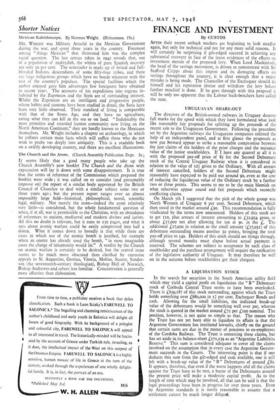FINANCE AND INVESTMENT
By CUSTOS
Aig k.0 their recent setback markets are beginning to look steadier again, but only for technical and not for any more solid reasons. It will certainly be surprising if gilt-edged succeed in achieving any substantial recovery in face of the latest evidences of the effects on investment morale of the proposed levy. When Lord Mackintosh, the head of the savings movement, is driven to remonstrate with Sir Stafford Cripps about this impost and its damaging effects on savings throughout the country, it is clear enough that a major mistake is being made. The Chancellor of the Exchequer should do himself and his reputation justice and withdraw the levy befure further mischief is done. If he goes through with this proposal it will be only too apparent that the Labour backbenchers have called the tune. 6
URUGUAYAN SHARE-OUT
The directors of the British-owned railways in Uruguay deserve full marks for the speed with which they have formulated what look like reasonably fair proposals for splitting up the proceeds of the recent sale to the Uruguayan Government. Following the precedent set by the Argentine railways the Uruguayan companies enlisted the help of an independent panel, and at first glance the proposals as now put forward appear to strike a reasonable compromise between the just claims of the holders of the prior charges and the nuisance value of the junior stockholders. If I have any quarrel at all it is with the proposed pay-off price of 85 for the Second Debenture stock of the Central Uruguay Railway when it is considered in relation to the value of I21 given to the Ordinary. With all arrears of interest cancelled, holders of the Second Debenture might reasonably have expected to be paid out around 9o, even at the cost of reducing the liquidation value of the Ordinary stock by a further two or three points. This seems to me to be the main blemish on what otherwise appear sound and fair proposals which reconcile conflicting claims.
On March 5th I suggested that the pick of the whole group was North Western of Uruguay 6 per cent. Second Debenture, which then stood in the market around £90. This recommendation is fully vindicated by the terms now announced. Holders of this stock are to get Ito, plus arrears of interest amounting to £32,934 gross, or about £17,000 net after allowing for tax at 9s. in the £. The additional £17,00o in relation to the small amount (£57,031) of this debenture outstanding means another 3o points, bringing the total pay-off price to 140. Holders of this stock should see things through, although several months must elapse before actual payment is received. The schemes are subject to acceptance by each class of stockholder and the purchase arrangement will require the ratification of the legislative authority of Uruguay. It may therefore be well on in the autumn before stockholders get their cheques.
A LIQUIDATION STOCK In the search for securities in the South American utility field which may yield a capital profit on liquidation the " B " Debenture stock of Corboda Central Trust seems to have been overlooked. There is £639,187 of this stock outstanding, against which the Trust holds something over 080,mo in II per cent. Exchequer Bonds and cash. Allowing for the small liabilities, the indicated break-up value of the debentures would be something well over par, whereas the stock is quoted in the market around £72 per Ltoo nominal. The position, however, is not quite so simple as that. The reason why the Trust has not yet been able to liquidate its affairs is that the Argentine Government has instifined lawsuits, chiefly on the ground that certain sums are due in the matter of pensions to ex-employees of the Cordoba Railway. The Trust is contesting these claims, but has set aside in its balance-sheet £171,139 as an "Argentine Liabilities Reserve." This sum is considered adequate to cover all the claims involved on the assumption that in every case the Argentine Govern- ment succeeds in the Courts. The interesting point is that if one deducts this sum from the gilt-edged and cash available, one is still left with a break-up value of the " B " Debentures of around £80. It appears, therefore, that even if the worst happens add all the claims against the Trust have to be met, a buyer of the Debentures around the present price will make a moderate capital profit. As to the length of time which may be involved, all that can be said is that the legal proceedings have been in progress for over three years. Even by Argentine standards it is surely reasonable to assume that a settlement cannot be much longer delayed.


































 Previous page
Previous page